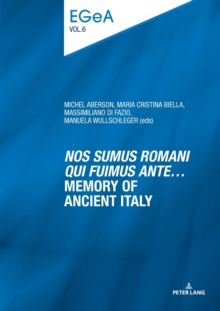Description
| Product ID: | 9783034328890 |
| Product Form: | Paperback / softback |
| Country of Manufacture: | CH |
| Series: | Etudes genevoises sur l’Antiquite |
| Title: | «Nos sumus Romani qui fuimus ante…» Memory of ancient Italy |
| Authors: | Author: Manuela Wullschleger, Philippe Collombert, Michel Aberson, Massimiliano Di Fazio, Maria Cristina Biella |
| Page Count: | 244 |
| Subjects: | Archaeology by period / region, Classical Greek & Roman archaeology, Italy, Ancient Rome |
| Description: | In 2011 Michel Aberson, Maria Cristina Biella, Massimiliano Di Fazio and Manuela Wullschleger (two Italians and two Swiss, two archaeologists and two historians of antiquity) met in Geneva at the Fondation Hardt pour l'étude de l'Antiquite classique and decided to undertake a challenging project together: to organize three conferences on the peoples of central Italy, taking into consideration the key milestones in their history, from their independence, through their relations with Rome and ending with the (re)construction of their identities within the Roman world. Underpinning the project, which immediately found the support of many colleagues and institutions, was the idea of bringing historians, archaeologists, linguists and specialists of Latin literature together to collaboratively create a comprehensive picture of these significantly multifaceted and sometimes even conflicting topics. The present volume is the outcome of the third conference of the series E pluribus unum? Italy from the Pre-Roman fragmentation to the Augustan Unity, held at the University of Oxford in October 2016; it deals with the specific moments of conscious rediscovery of conquered peoples’ contribution to Roman culture from the late Republic and during the Empire. These influences can be recognized particularly during the Late Republic and Augustan period, and the final outcome is the formation of a connective tissue, which can be described as the cement of the "unaccomplished identity" of ancient Italy. The volume investigates the issue from different perspectives in order to avoid the adoption of a Romanocentric perspective. In 2011 Michel Aberson, Maria Cristina Biella, Massimiliano Di Fazio and Manuela Wullschleger (two Italians and two Swiss, two archaeologists and two historians of antiquity) met in Geneva at the Fondation Hardt pour l''étude de l''Antiquite classique and decided to undertake a challenging project together: to organize three conferences on the peoples of central Italy, taking into consideration the key milestones in their history, from their independence, through their relations with Rome and ending with the (re)construction of their identities within the Roman world. Underpinning the project, which immediately found the support of many colleagues and institutions, was the idea of bringing historians, archaeologists, linguists and specialists of Latin literature together to collaboratively create a comprehensive picture of these significantly multifaceted and sometimes even conflicting topics. The present volume is the outcome of the third conference of the series E pluribus unum? Italy from the Pre-Roman fragmentation to the Augustan Unity, held at the University of Oxford in October 2016; it deals with the specific moments of conscious rediscovery of conquered peoples’ contribution to Roman culture from the late Republic and during the Empire. These influences can be recognized particularly during the Late Republic and Augustan period, and the final outcome is the formation of a connective tissue, which can be described as the cement of the "unaccomplished identity" of ancient Italy. The volume investigates the issue from different perspectives in order to avoid the adoption of a Romanocentric perspective. |
| Imprint Name: | Peter Lang AG, Internationaler Verlag der Wissensc |
| Publisher Name: | Peter Lang AG, Internationaler Verlag der Wissenschaften |
| Country of Publication: | GB |
| Publishing Date: | 2020-03-31 |
